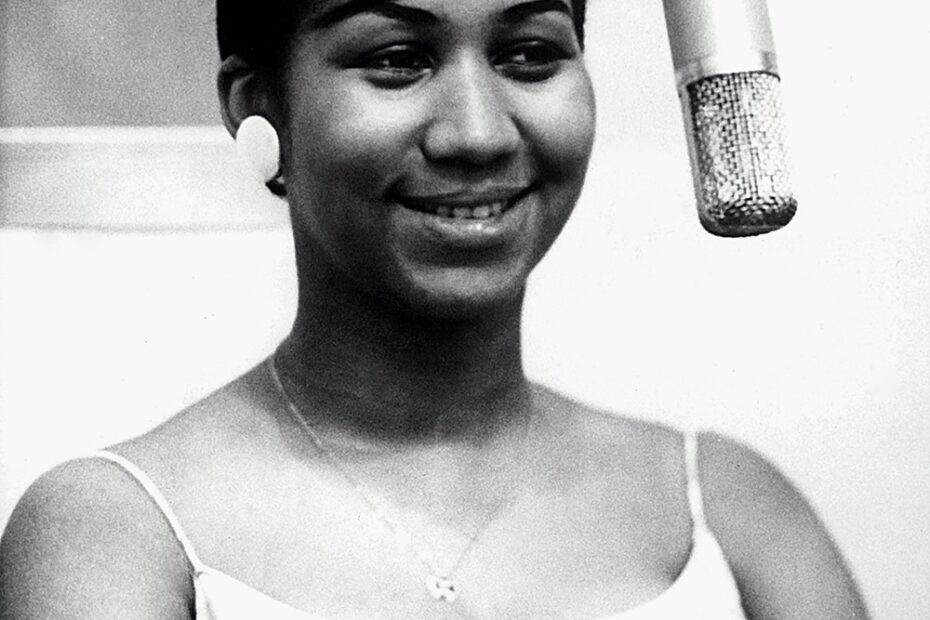Coming to Muscle Shoals was the turning point in my career.
-Aretha Franklin
The Swampers’ integrated soul, rock and the blues to become sought-after, elite instrumentalists
-Andrew Goutman
-It was like, rock ‘n’ roll heaven
– Keith Richards
Now Muscle Shoals has got the Swampers
And they’ve been known to pick a song or two
Lord, they get me off so much
They pick me up when I’m feeling blue
Now how ’bout you?
~Lynyrd Skynrd, “Sweet Home Alabama”
They got Aretha to record a much more funky kind of style in Muscle Shoals. It was really the essence of her.
– Mick Jagger
Down South for Sweet Inspiration
In January 1967, with America in turmoil (sound familiar?) a young singer named Aretha Franklin arrived in the small Alabama town of Muscle Shoals, her career hanging in the balance. She was sent there by a wily genius named Jerry Wexler of Atlantic Records. At the age of 25 Franklin was already a music veteran. She had recorded nine albums, none of which had properly captured the fiery, transcendent intensity of her voice or the rapt, prayerful beauty of her piano playing. But over the course of just a few hours, in a studio where she had never worked before, with musicians whom she had met for the first time that day, Franklin would record not only the most important song in her career but one of the greatest songs in the history of pop music, I Never Loved a Man the Way That I loved You, which became the featured track on the album of the same title.
Sublime Swamp Creatures
The mainstay of the The Swampers, was keyboardist Barry Beckett, drummer Roger Hawkins, bassist David Hood and guitarist Jimmy Johnson. Usually known as the Muscle Shoals Rhythm Section, the Swampers were rapidly becoming known world-wide as the creme de la creme of studio session musicians. Along with Rick Hall, the founder of FAME Studios, they are recognized as having crafted the “Muscle Shoals sound.”
They would not only back Aretha in her breakthrough record in Muscle Shoals, they would also travel to New York at Wexler’s insistence to back all her important, industry-changing music for Atlantic Records.
Aretha’s Genesis
According to her birth records, on Wikipedia, “Aretha Louise Franklin was born on March 25, 1942, to Barbara (née Siggers) and Clarence LaVaughn “C. L.” Franklin, in Memphis Tennessee. Her father was a Baptist minister and circuit preacher originally from Shelby, Mississippi, while her mother was an accomplished piano player and vocalist.” Imagine that! She came by her talent honestly, her mom and pop were also incredible performers.
C. L. Franklin was also known as the man with the “million-dollar voice”. He earned thousands of dollars for sermons in various churches across the country.
He was also known, according to very reliable sources, as quite the cad, a ladies man, if you will.
Soul Prodigy with Pentecostal-Like Intensity
Young Aretha went on tour with Mavis Staples when she was all of 18-years old. Her idol was, and a man she eventually met, was, you guessed it, Sam Cooke. So she traveled a bit with his Soul Stirrers.
What is important and very vital to understanding Aretha Franklin’s influence on music and singers today, is that she managed to merge the sublime ecstasy of gospel music with the yearning of the blues and pop music. Before Aretha, no artist had ever managed to pull off this marriage of musical genres. Now, Sam Cooke, who possessed a fine a voice that was ever created, did indeed bring together gospel and pop, both with the Soul Stirrers and as a solo artist, but never with the same unforgettable soul and profundity of Aretha.
Respect for the Queen
My own introduction to Aretha and the classic hit “Respect”, came via my friend and fellow music maven, the indefatigable, Chip Gavron. He had loved, loved, the immortal Otis Redding, who wrote “Respect”, and his 1965 hit version of the song, thanks to the relentless Gavron, was always on the neighborhood playlist.
Like I said, Chip was onto classic soul music early on, and was persistent in making sure we had a strong helping of Otis, Carla Thomas, Sam & Dave, Sam Cooke and others in between our Beatles,Stones and British Invasion-listening marathons.
Then, in 1967, while we were gaga over Sgt. Pepper’s Lonely Hearts Club Band, Gavron introduced to another epoch-changing artist we had never heard before: Aretha Franklin and Respect. Arranged quite differently, Otis would proclaim; “That girl stole that song from me,” Redding says during a clip in a VH-1 special on Aretha Franklin that aired in spring 2001. The “stolen” song is Redding’s own “Respect.” No doubt the “theft” was made up for by the hefty writer royalties the Memphis soul great earned from the million-plus sales of the single. Though Redding had a 1965 number five R&B hit with the song, it would be Franklin’s version which earned the most “respect.”
Divine Influence Indeed
So, no Aretha,
No; Whitney Houston
No: Mary K. Blige
No: Chaka Khan
No: Toni Braxton
No marriage of Gospel and Rock
No: Fantastic, scene stealing, movie-making, hip-shaking, soulful rendition of “Think” from the Blues Brother’s movie.
An Album for the Ages
“It just goes on and on being what it is: one of the perfect mid-century genre collisions—turbo-powered gospel conviction hitting small-scale romantic R & B midships and not sinking the boat, instead joining forces to create some new kind of hybrid vessel that just…well, it just sails. I think the record contains some of the most nakedly thrilling singing ever sung.”
-Nick Coleman (Voices author) Talking about the influence of the breakthrough first Atlantic album; I Never Loved a Man They Way I Love You
For Chip, Mr. Stax Records
